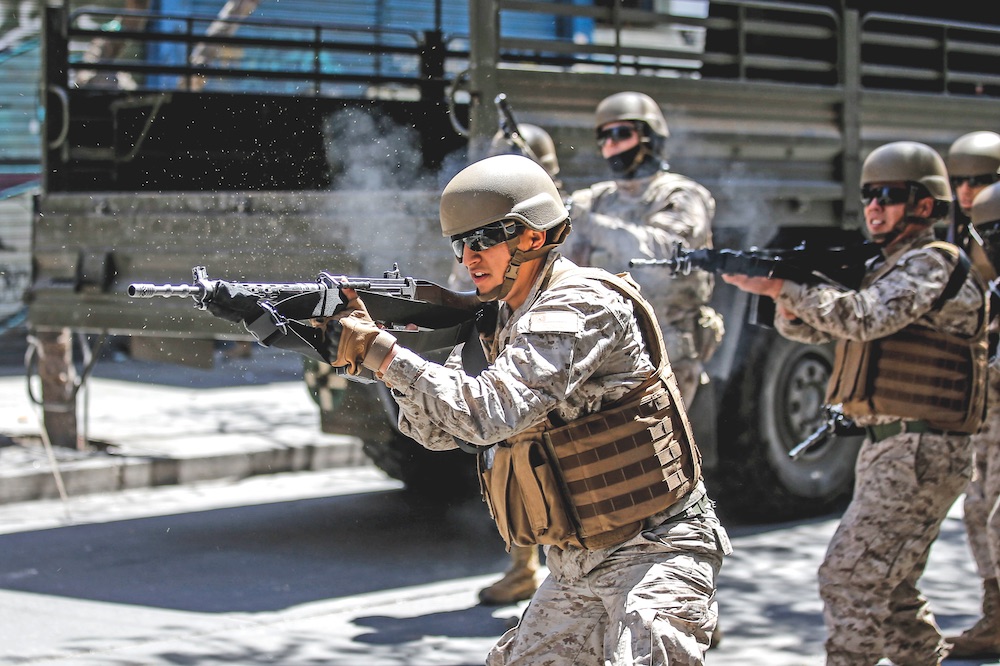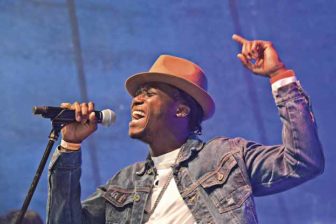This article is adapted from AQ’s special report on Latin America’s armed forces.
SANTIAGO — The Santiago Museum of Memory and Human Rights was inaugurated ten years ago to commemorate the victims of Augusto Pinochet’s dictatorship (1973-1990). Its imposing rectangular building, made of concrete and dark-green glass, has since become one of Santiago’s main attractions, receiving thousands of people every month — from high-school students to foreign tourists. Yet one local institution has never sent a group of visitors: the Chilean military, which was in power and committed most of the abuses exposed in the museum’s galleries.
Until recently, most observers of Latin America’s militaries would dismiss these “little” signs as almost irrelevant. The general thought was that the region’s soldiers were well adapted to democracy, including in countries that had experienced harsh military rule in a not so distant past. However, recent political developments — particularly the wave of political instability that swept Ecuador, Bolivia, Chile and Colombia and brought the region’s militaries to the fore — are forcing us to go back to a fundamental question.
How much did the armed forces’ views on human rights and democracy really change since they left power, at least three decades ago? The answer: less than we had thought.
Chile is a case in point. In October, when the recent wave of demonstrations spiraled out of control, President Sebastián Piñera called in the military using the constitutional provision of the “state of emergency.” For many, the image of soldiers in the streets and enforcing curfews immediately brought back dark memories. Their fear turned out to be well founded as widespread human rights violations ensued, as denounced by Amnesty International and Human Rights Watch (HRW). Most of the repression was conducted by the national police, which — under the state of emergency — was reporting to military commanders in large cities like Santiago and Valparaíso.
The political conversation in Chile has gone through a swift transformation. The risks of military intervention have become a common theme in interviews and statements of political leaders from across the ideological spectrum. Such talk was practically inconceivable until mid-October 2019, when the protests began. The abruptness of the change indicates that some trends had been grossly underestimated or altogether ignored. Also, it is now clear that the tools used to adapt the military to a new democratic and human rights reality were inefficient.
As the director of HRW’s Americas division, José Miguel Vivanco, said after delivering his report on recent violations against protestors in Chile: “The route to confronting the problem should not be a new series of workshops on human rights for the Chilean police and military. Deeper changes are necessary.”
Lessons of the past
In countries that have experienced widespread torture and disappearances at the hands of the military, one would expect human rights training to incorporate the nightmares of the past. This is not the case in Chile. As the museum example illustrates, the new generation of soldiers are not exposed to the crimes and lessons of the past. Even a landmark 2004 report—through which Army Commander Juan Emilio Cheyre recognized past armed forces’ participation and responsibility for crimes committed during the Pinochet era—is largely ignored in military schools and academies.
Human rights training occupies a small portion of the military curriculum, with one or two lectures by officers who usually don’t have certification in the field. Even those lectures are restricted to general normative aspects, with little or no contextualization. Tellingly, the armed forces does not have any serious relationships with the National Human Rights Institute, a public entity established in 2005 to promote education in human rights.
The failure of adapting the military to a new democratic reality has two main causes in Chile and in most Latin American countries. One is that the armed forces remained insulated and civilians never fully established their authority over the military. Despite formal civilian oversight, the military is still a corporation pursuing its own interests and rejecting outside interference — including on topics such as human rights education.
Meanwhile, civilian elites’ attitudes towards the military has usually been one of disinterest: If there is no threat of a coup, then there is no point in pushing for more effective civilian control. Argentina went the furthest in efforts to transform formal obedience into effective control. Brazil is on the opposite side of the scale as a case of ample autonomy and very weak civilian oversight. Most other Latin American countries are closer to the Brazilian end.
The second cause for failure has been the expansion of militaries’ role into domestic security. An inefficient and poorly managed police force will inevitably result in greater roles for the military in issues of internal security, especially in places where crime is on the rise or has remained high. The military has been cracking down on crime in several countries — from Mexico to Brazil — and these new missions drastically increase the risk of human rights violations. The same is true in Chile, where a militarized police force has been suffering from multiple deficiencies — and in fact was responsible for most of the violence against protestors.
The reason for the armed forces’ insulation and expanded role is a story of civilian policymakers abdicating their responsibility. But can the civilians also adapt to a new era of democracy and human rights in Latin America?
—
Agüero is a professor at the University of Chile and the editor of Fault Lines of Democracy in Post-Transition Latin America







